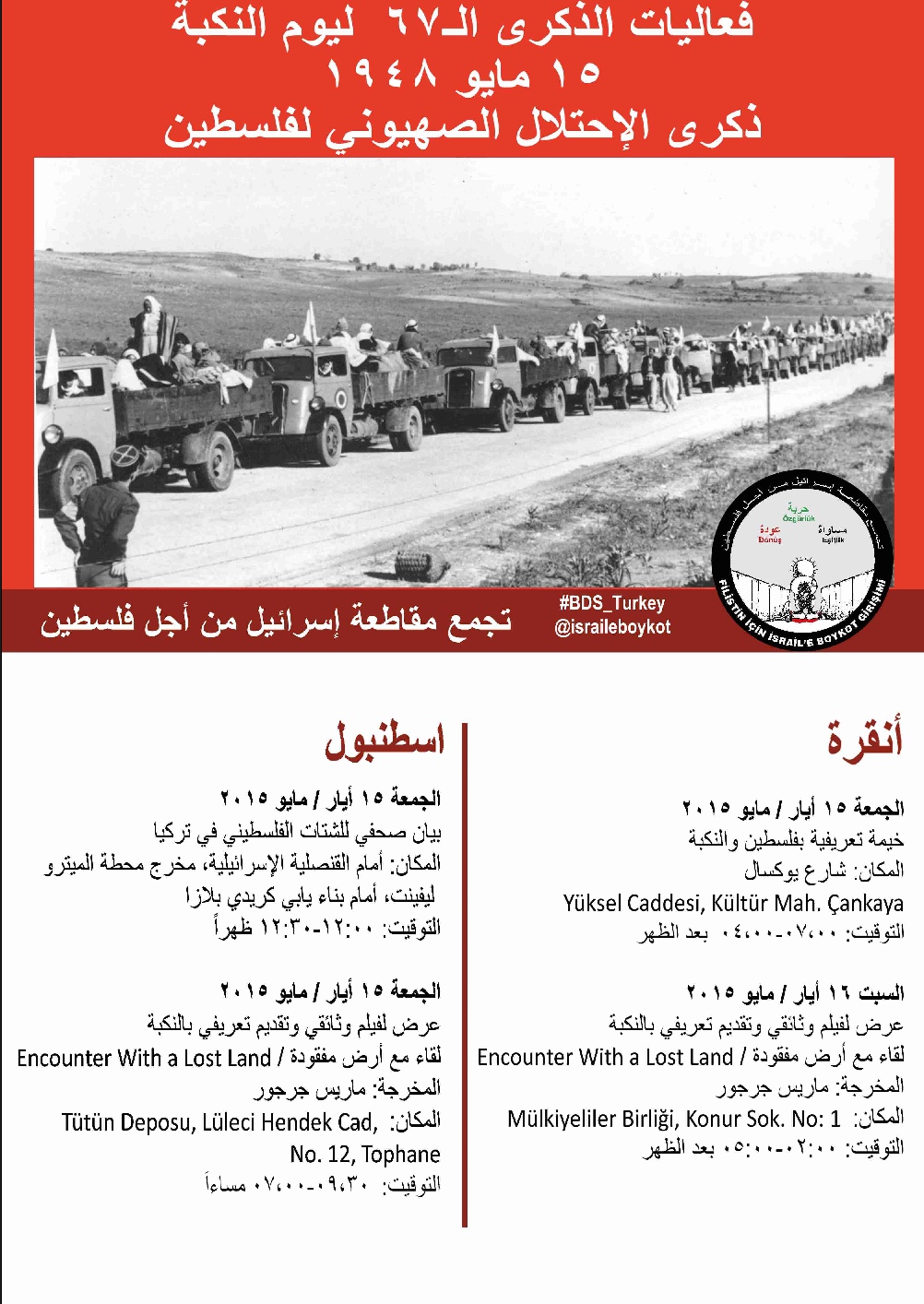67. Filistin “Nakba Günü” Etkinlikleri
15 Mayıs 1948; İsrail bağımsızlığının değil Siyonist işgalin yıldönümü
15 Mayıs 1948’de modern tarihin en önemli felaketlerinden biri yaşandı. O gün bir milyona yakın Filistinli, İsrail silahlı güçleri tarafından, tarihsel Filistin’deki evlerinden zorla çıkartıldı ya da kaçmak zorunda kaldı. Bu olayın öncesinde birçok köyde aynı güçler tarafından katliamlar yapılmıştı. Birçok Filistinli terk ettikleri evlerine bir süre sonra dönebileceklerini düşünüyordu. Aradan 67 yıl geçti, dönemediler. Büyük Felaket yani Nakba, Filistin’de ve dünyanın her yerinde Filistinliler ve Filistin halkının dostları tarafından her yıl lanetleniyor, işgalci, apartheid İsrail rejimi protesto ediliyor.
Öte yandan, 15 Mayıs 1948, İsrail’de ve dünyanın pek çok yerinde bulunan İsrail elçiliklerinde İsrail’in kuruluş günü olarak kutlanıyor. Türkiye’de de bulunan İsrail temsilciliklerinde her yıl, Filistinlilerin evlerinden, yurtlarından sürülmesi, katledilmesi törenlerle kutlanıyor. Çünkü Türkiye, hükümet ve devlet yetkililerinin sert açıklamalarına rağmen, İsrail’le diplomatik ilişkilerini kesmiyor.
Sadece diplomatik ilişkiler de değil, Türkiye ve İsrail arasında, halka açıklanmayan askeri anlaşmalar, akademik ve kültürel ilişkiler sürüyor. Birçok kaynak, İsrail ve Türkiye arasındaki ticaret hacminin son on yılda arttığını gösteriyor. Türkiye, başta Kürt halkına karşı kullandığı heronlar olmak üzere, İsrail silah sanayinin önemli müşterilerinden biri. Heron uçaklarının bilgi sistemleri halen İsrail’e bağlı ve Türkiye – İsrail arasında, Suriye ve Irak sınırında yapılan ortak istihbarat toplantılarıyla Türkiye İsrail’in Ortadoğu halklarına karşı düşmanca politikalarına ortak oluyor.
Şunu unutmayalım, Filistinlilerin büyük felaketine rağmen T.C. İsrail`i tanıyan ilk ülke olmuştur. Daha sonra da Ortadoğu’da bu gayrı meşru devletle ilk ticari ve diplomatik ilişki kuran devlet de T.C. oldu. Aynı zamanda, T.C. İsrail’le askeri ilişki kuran tek Ortadoğu devletidir. AKP Hükümetinin İsrail’e karşı sözde sert tutumuna rağmen son 10 yıldaki veriler Türkiye ve İsrail arasındaki ticaret hacminin sürekli arttığını göstermektedir. 2014 yılında ticaret hacmi 5,5 milyar doları aşmıştır. AKP hükümetinin bu ikiyüzlü tutumu, Siyonist İşgalci İsrail devletinin ekonomisini güçlendirerek Filistin halkının kendi topraklarında yaşadığı zulmün devam etmesine sebep olmaktadır.
Bizler, Filistin halkının dostları olarak, Filistin halkının, demokratik kitle örgütlerinin, siyasi örgütlerin 2005 yılında yaptığı çağrıyı dikkate alarak, İsrail Arap topraklarındaki işgal ve sömürgeleştirmeye son verene, İsrail’de yaşayan Arap-Filistinlilere yönelik ayrımcılığa son verilip, onların. Tarihsel Filistin toprağında yaşayan ve işgalci apartheid İsrail’in vatandaşı olan Yahudilerle eşit haklara sahip olması sağlanana ve BM. 194 sayılı kararı uyarınca, dünyanın her yerindeki Filistinlilerin geri dönüş hakkı tanınana kadar İsrail’le her türlü ekonomik, diplomatik, kültürel, akademik, siyasal, askeri ilişkinin boykot edilmesini, İsrail’e yaptırımlar uygulanmasını ve bu gayrı meşru devletle yatırımların geri çekilmesini istiyoruz.
Sizleri, Filistin’in sesini olmaya ve Filistin İçin İsrail`e Karşı Boykot Girişimi ve Türkiye’deki Filistin Diasporası olarak, İstanbul ve Ankara`da gerçekleştireceğimiz 67. Nakba Günü etkinliklerine katılmaya davet ediyoruz.
Filistin’e özgürlük, İsrail’e boykot
İstanbul
15 Mayıs Cuma
Türkiye’deki Filistin Diasporası basın açıklaması
Yer: İsrail Başkonsolosluğu, Levent Metro çıkışı, Yapı Kredi Plaza C Blok önü
Saat: 12.00 - 12.30
15 Mayıs Cuma
Belgesel gösterimi, sunum ve söyleşi
-Kayıp Ülkeyle Karşılaşma/Encounter With a Lost Land
Yönetmen: Maryse Gargour
Yer: Tütün Deposu, Lüleci Hendek Cad, No. 12, Tophane
Saat: 19.00 – 21.30
Ankara
15 Mayıs Cuma
Filistin – Nakba tanıtım çadırı
Yer: Yüksel Caddesi, Kültür Mah. Çankaya
Saat: 13.00 – 16.00
16 Mayıs Cumartesi
Belgesel gösterimi, sunum ve söyleşi
-Kayıp Ülkeyle Karşılaşma/Encounter With a Lost Land
Yönetmen: Maryse Gargour
Yer: Mülkiyeliler Birliği, Konur Sok. No: 1 Kızılay
Saat: 14.00 – 17.00
Filistin için İsrail’e Boykot Girişimi
